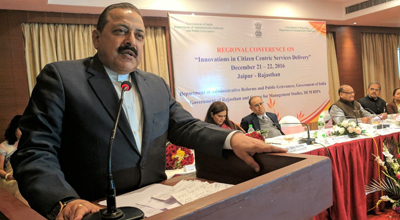
Excelsior Correspondent
JAIPUR, Dec 22: Union Minister of State (Independent Charge) for Development of North Eastern Region (DoNER), MoS PMO, Personnel, Public Grievances, Pensions, Atomic Energy and Space, Dr Jitendra Singh has called upon the State Governments to strictly follow the DoPT and ARPG guidelines laid down by the union Ministry of Personnel because these are in the larger interest of good governance and for making the administration more citizen-centric and accountable.
He also put the record straight as far as the postings of district heads are concerned and stated that the posts of District Development Commissioner / District Collector or Senior Superintendent of Police in-charge of district are essentially the cadre posts which are expected to be filled with officers from IAS or IPS cadre and not the provincial services.
Dr Jitendra Singh was addressing the valedictory session of the regional conference on “Innovation in Citizen Centric Delivery” here today. Pertinent to mention that this is one of the series of similar regional conferences started by the Ministry to carry the message of citizen- centric governance to every nook and corner of the country. The last such conference was held in Jammu and prior to that, similar conferences have been held in other parts of the country, including Nagpur and Guwahati. The next such conference is scheduled to be held in the month of January at Visakhapatnam in Andhra Pradesh.
Speaking on the occasion, Dr Jitendra Singh lamented that some of the most path-breaking administrative reforms brought in by the Modi government in the last two years are yet to be effectively implemented by certain State Governments. He particularly mentioned the revolutionary decision to abolish interviews for selection to junior posts which was announced by Prime Minister Narendra Modi himself and has since been implemented in all the Ministries of the Central Government. He urged upon the State Governments which are yet to adopt this reform to expedite it, because it is in the interest of providing a level-playing field with equal opportunity to young job seekers from every segment of society regardless of their socio-economic background. At the same time, he also had a word of praise for some States including Rajasthan and Maharashtra which had not only promptly implemented this reform, but also come out with the statistics to show how the abolition of interviews had also tremendously saved the expenditure of State exchequer.
Lauding the efforts of the officers in the Department of Administrative Reforms and Public Grievances, Dr Jitendra Singh said, the citizen-centric service delivery provision has been adopted by many States, but needs to be made more effective. In India of today, he said, where more than 65-70% population is below the age of 40 years, citizen-centric delivery essentially means youth-centric delivery keeping in focus the priorities and aspirations of the youth.
Dr Jitendra Singh also complimented the Department of ARPG for having activated the grievance cell and noted that in the last one year, the grievance disposal has gone up to nearly 100%. He said, we follow a timeline and every weekend not only the number of grievances disposed is calculated, but he himself also personally calls up some of the complainants at random to verify their level of satisfaction. At the same time, he hastened to add that the citizens need to be educated that the Department of ARPG takes the responsibility of disposing off a grievance within a limited time-frame, but the disposal of the grievance does not mean that it would satisfy the aspiration of the complainant which may sometimes be subjective or unwarranted like, for example, if a complainant has a grievance that he was not given the promotion which was available to his peers, the responsibility of the ARPG Department is to obtain the facts from the concerned Ministry and convey back to him why the concerned Ministry did not find him fit for promotion, which, in other words, means that the complaint has been disposed off by the ARPG Department, but that does not mean that ARPG can also ensure a promotion for the complainant for which he rightly or wrongly feels entitled to, because that is an issue to be decided by the concerned Ministry or Department. However, he said, complaints relating to arrear dues, pension dues, delayed passports, etc. are being invariably addressed to the complete satisfaction of the complainants.
Under the inspiration of Prime Minister Narendra Modi, Dr Jitendra Singh referred to another innovative idea introduced by Department of ARPG last year wherein every IAS officer, who has put in 30 to 35 years of service, is expected to go back to his very first posting as SDM or Collector and write an account of it. This not only enables the officer an opportunity to go back to the origins of his service career, but also to have an assessment of how far the area has progressed in the last three decades during the period when he was progressing from higher-to-higher posts, he added.
The conference was attended,among others, by Union Secretary ARPG C. Viswanath, Additional Secretary Usha Sharma and Joint Secretaries from ARPG, senior Secretaries and officers from different State Governments and scholars in thefield of public administration.

